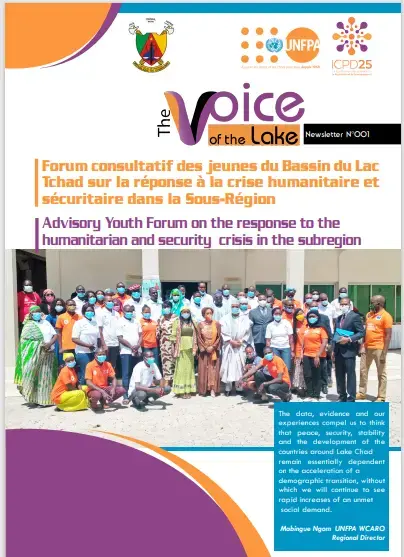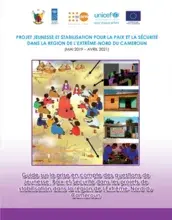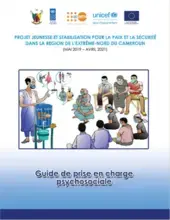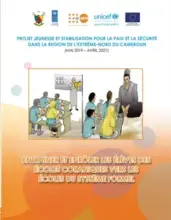EDITO
Let there be peace! Let us invest in young people.
The protracted security crisis resulting from terrorist attacks by non-state armed groups since some eleven years now has a very heavy toll on all walks of life in the Lake Chad Basin. Evidence shows a worrisome situation. So far, no less than 11,000 people have been killed. About 10 million other people have been displaced and rendered homeless across the borders in Cameroon, Chad, Niger and Nigeria. Socioeconomic infrastructures and amenities such as schools, health facilities have been totally destroyed in most of the communities along the borders. Economic activities such as agriculture, tourism and fishing are on a standstill. These increased attacks against civilians, compounded by the effects of climate change, natural disasters and disease outbreaks are exacerbating the needs of a population already afflicted by years of insecurity. In effect, in the area, there has been acute deficit of socioeconomic amenities while the Lake Chad which is the main source of livelihood for close to 20 million people surrounding it has been shrinking at an alarming rate. As of date, data from the four countries’ Humanitarian Response Plan for 2020 show that some 19.1 million people out of the about 30 million inhabitants living in that area are in a dire need of urgent humanitarian assistance.
Women and girls, men and boys are all directly touched by this wave of unprecedented violence. The former are abducted and raped, serving as spies and human bombs. The latter are lured and recruited as fighters into armed groups. This state of affairs brings to the limelight the issue about the necessity to act urgently in order to address the crisis and reverse the trend. In this case, investing in young people happens to be a strategy with far-reaching impact. Empowering them means ensuring a brighter future for all, especially given that they constitute the majority of the population. As a matter of fact, young people below the age of 35 make up about 75 % of the total population in the Lake Chad Basin area. Such a demographic dividend needs to be captured and harnessed. Disrupted basic social services need to be reconstructed. And this is the rationale that led to the setting-up of a Platfom by UNFPA to unlock the demographic dividend and build resilience in the Lake Chad Basin. Conceived as an innovative and comprehensive model to coordinate and ensure coherence of UNFPA interventions within the Humanitarian, Development and Peace Nexus, the technical coordination team of the Platform is based in Maroua, North of Cameroon. That region of Cameroon embodies all the concerns of the entire Lake Chad Basin Area.
According to data from Cameroon’s National Population Census conducted in 2005, high fertility rate, high illetracy rate, persistent insecurity, insufficiency or absence of basic health services including access to reproductive and sexual health, practice of nefarious gender based violence such as female genital mutilations, youth unemployment are some of the characteristics of the Maroua region that alone has more than 4 million inhabitants out of the about 25 million in the country. This makes it the most populated region, and also the region with the worst poverty index. The North East of Nigeria with the federated states of Borno, Yobe and Adamawa, the Hadjer-Lamis and Lake provinces in Chad as well as the Diffa Province in Niger share the same features. It is against this backdrop that UNFPA organised the Maroua Youth Advisory Forum on the response to the humanitarian and security crisis in the sub-region, held from October 26th to 29th 2020 under the theme: « The world as we want it», translated in French as ‘’Le monde que nous voulons». The initiative intended to get young people’s views about what ought to be done to address the security, demographic and development challenges in the Lake Chad Basin falls in line with UNFPA vision of giving the youths the necessary potential for their full empowerment.
Given the covid-19 pandemic that limits the regrouping on a same spot of a large number of people, the choice was made to organise a forum in each of the four countries concerned. The Maroua lap in Cameroon was therefore the first in a series of four. Expected now are the Chad, Niger and Nigeria stages. This bilingual Newsletter highlights the main issues raised by youths of Cameroon during their 4-day stay in the Chief town of the Country’s Far North region. You will find among things, the Call to Action. It is an appeal by youths of the area on stakeholders to reinforce their support to youth’s initiatives as well as provide a conducive and enabling environment for the implementation of development-oriented policies.
There is also an interview of UNFPA Resident Representative for Cameroon Mrs. SITI BATOUL OUSSEIN to whom I Express my congratulations for successfully conducting the Maroua Youth Advisory Forum. My appreciation also goes to stakeholders, including government authorities and partners, among whom the Governor of the Far North Region of Cameroon Mr. MIDJIYAWA BAKARI who personally chaired the event. I also thank nongovernmental actors whose involvement was key for the success of the Forum. I am looking forward to hearing from a similar move in the remaining countries of the Lake Chad Basin!
MABINGUE NGOM
UNFPA Regional Director for West and Central Africa





